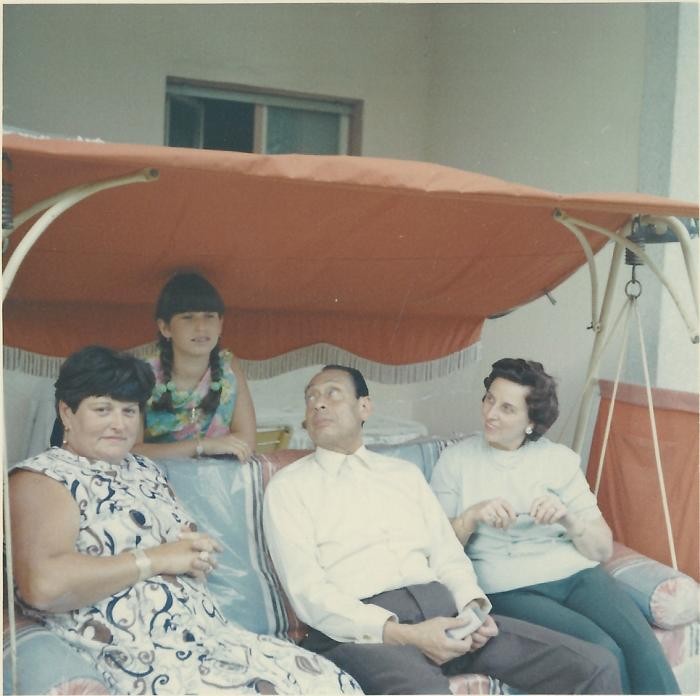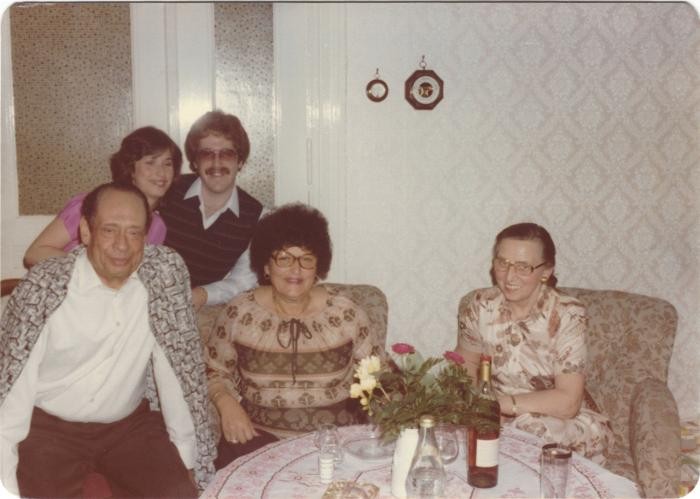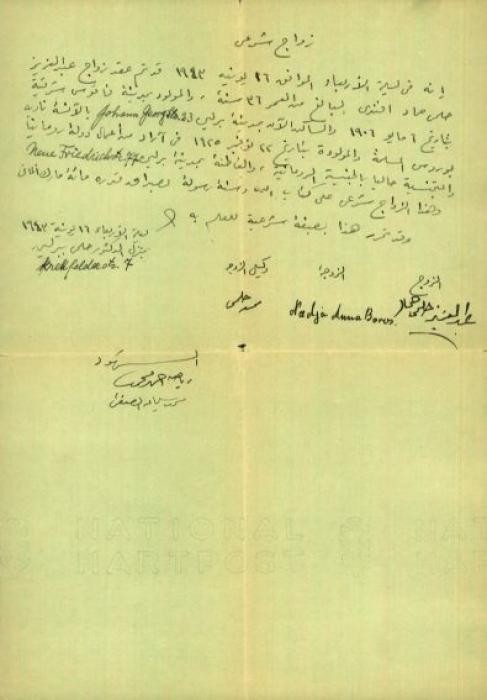
Mohamed Helmy
Dr. Mohamed Helmy, an Egyptian physician living in Berlin, and Frieda Szturmann, a local German woman, worked together in the heart of Nazi Germany to help save a Jewish family. Dr. Helmy was the first Arab to be recognized as Righteous Among the Nations.
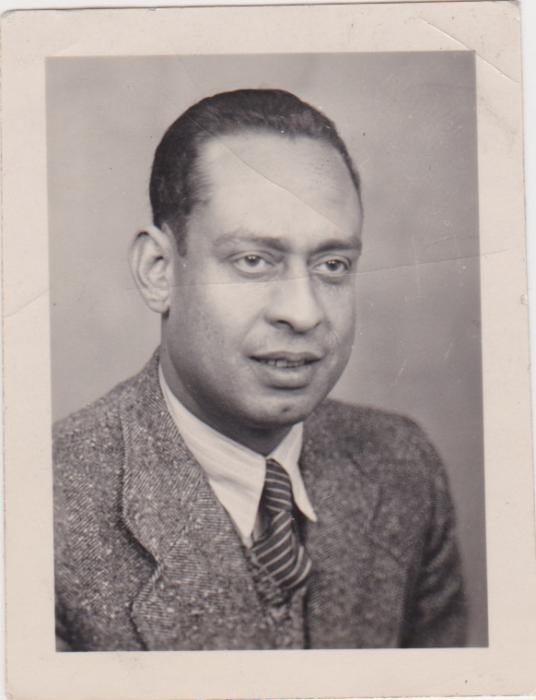
Mohamed Helmy was born on July 25, 1901, to an Egyptian father and German mother in Khartoum, the present day capital of Sudan. Helmy moved to Germany in 1922, where he studied medicine. After completing his studies, he went to work at the Robert Koch Hospital in Berlin. He became head of the urology department.
Helmy witnessed the dismissal of Jewish doctors from the hospital following Adolf Hitler’s rise to power in 1933 and the implementation of anti-Jewish legislation. According to Nazi racial laws, Helmy was classified as a “Hamite” after Ham, the son of Noah in the Old Testament. This term was adopted from 19th century racial science and used to classify natives of North Africa, the Horn of Africa, and the historical region of South Arabia. Those classified as Hamitic were considered non-Aryan and subject to harassment and persecution. Helmy was fired from the hospital in 1938 and barred from practicing medicine. Since he could no longer obtain a medical license, Helmy opened a private practice without licensure and practiced medicine in secret. Because of his race, he was also forbidden to marry his German fiancée, Emmi Ernst.
On September 5, 1939, immediately following the start of World War II, the Ordinance on the Treatment of Foreigners was implemented which required citizens of “enemy states” to register with the police. Beginning in October of that same year, Arabs in Germany, annexed Austria, and occupied Poland were arrested, jailed, and deported to the Wülzburg internment camp near Nuremberg. Egyptians were detained in Wülzburg to be exchanged for German civilians interned in Egypt. German Foreign Minister Joachim von Ribbentrop ordered that two Egyptians be interned for every one German interned in Egypt. Helmy was first arrested on October 3, 1939, and held for four weeks in police custody before being transported to Wülzburg, where he became very ill. He and the remaining Egyptians were released in early December 1939.
On January 3, 1940, Heinrich Himmler, Reich Leader of the SS and German Police, ordered the internment of all male Egyptian citizens between the ages of 18 and 60. Helmy was arrested again, despite his serious illness. Most of the Egyptians interned in Wülzburg were not released until June 1941. The Egyptian embassy was able to secure Helmy’s early release in 1940 due to his poor health. Until May 1941, he was forced to report to the police twice a day and provide proof every four weeks that he was unfit for internment.
After his release, Helmy was conscripted to the practice of Dr. Johannes Wedekind in Charlottenburg. While there, he wrote sick notes for foreign workers to help them return home and also for Germans to help them avoid conscription for heavy labor or militia service. When the deportations of Berlin’s Jews began, Anna Boros (later Gutman), a Jewish patient of Helmy’s, needed a hiding place. Despite being himself targeted by the Nazi regime, both because of his perceived racial inferiority and for actively speaking out against the Nazis, Helmy hid Boros until the end of the war. At particularly dangerous moments, when he was under police investigation, Helmy arranged for Boros to hide elsewhere, doing everything in his power to protect her. He obtained a certificate from the Central Islamic Institute in Berlin attesting to Boros’ conversion to Islam and also arranged for a marriage certificate (in Arabic) stating that she was married to an Egyptian man in a ceremony held in Helmy’s home. Helmy also provided assistance to Boros’ mother, Julianna; her stepfather, Georg Wehr; and her grandmother, Cecilie Rudnik. He arranged for Rudnik to be hidden in the home of Frieda Szturmann, a German friend of his. For over a year, Szturmann hid and shared her food rations with the elderly woman.
In 1944, Julianna Wehr was arrested and during her interrogation, revealed that Helmy was hiding her daughter, Anna. Helmy immediately took Boros to Szturmann’s home. Helmy had Boros write him a letter stating that she had deceived him about her true identity and was leaving to search for her mother and to seek out her aunt in Dessau. Helmy was able to avoid arrest by showing the letter to the Gestapo.
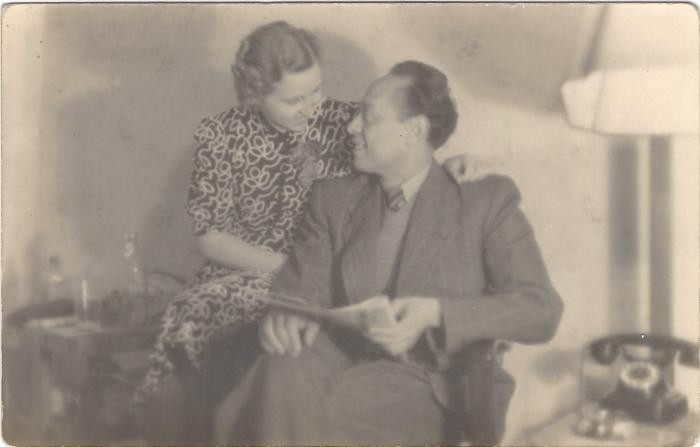
Anna Boros, Julie and Georg Wehr, and Cecilie Rudnik all survived the war thanks to Helmy and Szturmann. After the war, the family immigrated to the United States. Dr. Helmy remained in Berlin and was finally able to marry his fiancée, Emmi. He practiced medicine until his death in 1982.
In the 1950s and 1960s, Anna Boros and her family wrote letters on behalf of Helmy and Szturmann to the Berlin Senate. When these letters were discovered in the Berlin archives, they were submitted to Yad Vashem’s Righteous Among the Nations Department. Mohamed Helmy and Frieda Szturmann were honored as Righteous Among the Nations in March 2013. Helmy was the first Arab rescuer to be awarded the title.
Critical Thinking Questions
What pressures and motivations may have influenced the decisions of rescuers? Are these factors unique to this history or universal?
What pressures and motivations led Helmy to action?
Investigate choices (such as resisting, supporting the regime, remaining indifferent, or other actions) by medical professionals during the Holocaust.
How can societies, communities, and individuals reinforce and strengthen the willingness to stand up for others?


